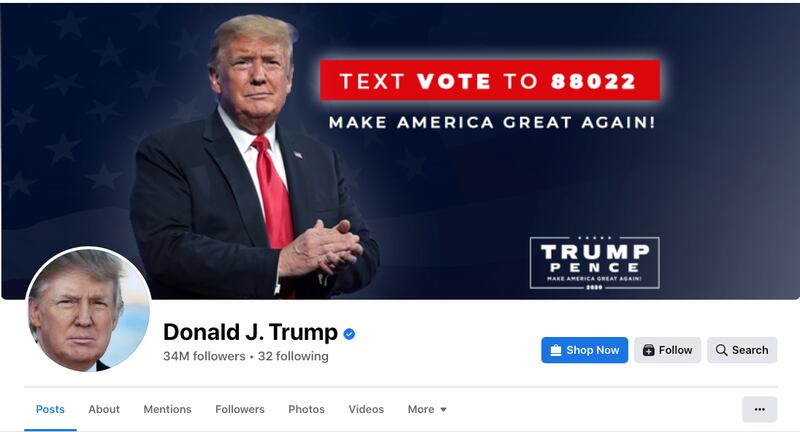Facebook and Instagram parent company Meta is set to lift its ban on Donald Trump who was kicked off the platforms in 2021 following his postings related to the U.S. Capitol insurrection on Jan. 6 of that year.
The move, which follows a Trump letter to Meta earlier this week asking to be reinstated, is widely considered to be a huge win for Trump and particularly when it comes to fundraising for his pursuit of the 2024 Republican presidential nomination.
Facebook announced its ban of Trump on Jan. 7, 2021, after the former president made unfounded, and since debunked, claims of electoral fraud in the 2020 election.
“The Board found that, in maintaining an unfounded narrative of electoral fraud and persistent calls to action, Mr. Trump created an environment where a serious risk of violence was possible,” the board posted in May of 2021. “At the time of Mr. Trump’s posts, there was a clear, immediate risk of harm and his words of support for those involved in the riots legitimized their violent actions.”
While Trump’s initial ban was characterized as permanent, Facebook’s Oversight Board reviewed the matter in May 2021 and decided it “was not appropriate for Facebook to impose the indeterminate and standardless penalty of indefinite suspension.” Instead, the board advised reducing the term of Trump’s ban to two years and it officially lifted on Jan. 7 of this year.
On Wednesday, Meta’s president of global affairs, Nick Clegg, published a blog post in which he offered some explanation of the process in allowing Trump to reengage with the 34 million Facebook followers and 23 million Instagram followers he had when the ban was instituted.
“The suspension was an extraordinary decision taken in extraordinary circumstances,” Clegg wrote. “The normal state of affairs is that the public should be able to hear from a former President of the United States, and a declared candidate for that office again, on our platforms.
“Now that the time period of the suspension has elapsed, the question is not whether we choose to reinstate Mr. Trump’s accounts, but whether there remain such extraordinary circumstances that extending the suspension beyond the original two-year period is justified.”
While Clegg said the oversight board had determined the risk that existed when Trump’s ban was imposed in 2021 “has sufficiently receded, and that we should therefore adhere to the two-year timeline we set out. As such, we will be reinstating Mr. Trump’s Facebook and Instagram accounts in the coming weeks.”
Clegg did note, however, that Facebook and Instagram had “new guardrails in place to deter repeat offenses.” And, Clegg wrote that Trump will face heightened sanctions for any subsequent violations of Meta’s Community Standards policies.
“In light of his violations, he now also faces heightened penalties for repeat offenses — penalties which will apply to other public figures whose accounts are reinstated from suspensions related to civil unrest under our updated protocol,” Clegg wrote. “In the event that Mr. Trump posts further violating content, the content will be removed and he will be suspended for between one month and two years, depending on the severity of the violation.”
Clegg hinted in his blog post that Trump’s current candidacy played a role in Meta’s decision to allow the former president back on its social media platforms.
“The public should be able to hear what their politicians are saying — the good, the bad and the ugly — so that they can make informed choices at the ballot box,” Clegg wrote. “But that does not mean there are no limits to what people can say on our platform. When there is a clear risk of real world harm — a deliberately high bar for Meta to intervene in public discourse — we act.”
Once reinstated, Trump will not only be able to tap his tens of millions of Facebook and Instagram followers for fundraising efforts, he’ll also be able to once again post political ads on the platforms.
“The main benefit of getting on Facebook is not so that he can communicate more,” Republican strategist Alex Conant, who worked on presidential campaigns including Florida Sen. Marco Rubio’s 2016 bid, told Bloomberg News. “It’s so that he can raise money from his millions of followers.”
According to a Bloomberg report, Trump’s campaign committees were among the largest advertisers on Facebook, spending more than $105 million on almost 756,500 ads during his 2020 reelection bid, according to an analysis by New York University’s Cybersecurity for Democracy.
Trump effectively used Facebook ads that asked users to complete a poll or respond to messages and provide their email addresses and cellphone numbers that the campaign could use to make direct solicitations, Damon McCoy, an associate professor of computer science and engineering at the New York University Tandon School of Engineering who studies Facebook advertising, told Bloomberg News.



